RISK FACTORS OF RSV
Infants and young children

Children with any of the following underlying conditions below are at a higher risk of severe RSV disease.1
- Premature infants
- Children with suppressed or weakened immune systems
- Children who have neuromuscular disorders or a congenital anomaly, including those who have difficulty swallowing or clearing mucus secretions
- Children with severe cystic fibrosis*
Those who are at risk and hospitalized may require oxygen, rehydration, and mechanical ventilation. Most improve with supportive care and are discharged in a few days.1
When infants and young kids get RSV, they often start with a runny nose and a drop in appetite before other symptoms show up. A cough usually kicks in within 1 to 3 days, followed by sneezing, fever, and wheezing. For very young babies, you might also see irritability, less activity, and even episodes of apnea.1
Adults 60 and older

Milder illness in adults typically resolves in 1–2 weeks. However, RSV can also cause severe disease and hospitalization in adults. 1
RSV can sometimes also lead to exacerbation of serious conditions such as: 1
- Asthma
- Chronic obstructive pulmonary disease (COPD)
- Heart failure
Epidemiologic evidence indicates that all adults ages 75 or older and adults ages 60–74 with certain risk factors are at increased risk of severe RSV. 1
Conditions that increase the risk for severe RSV1
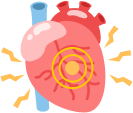
Chronic cardiovascular disease
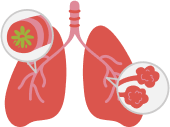
Chronic lung or respiratory disease

End-stage renal disease or dependence on hemodialysis or other renal replacement therapy
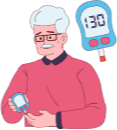
Diabetes mellitus complicated by chronic diseases
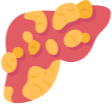
Chronic liver disease
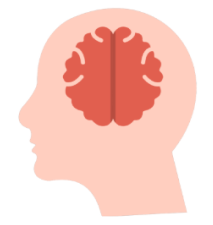
Neurologic or neuromuscular conditions causing impaired airway clearance.
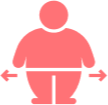
Severe obesity

Chronic hematologic conditions
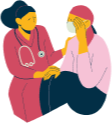
Moderate or severe immunocompromise patients

Residing in a nursing home
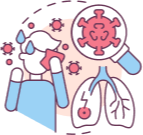
Other chronic medical conditions
*Cystic fibrosis is a disorder that damages your lungs, digestive tract and other organs.2
Image is for representation purposes only
RSV - Respiratory Syncytial Virus
CDC - Center for Disease Control and Prevention
RSV - Respiratory Syncytial Virus
CDC - Center for Disease Control and Prevention
REFERENCES:
- CDC. (2024, October 3). Clinical Overview of RSV. Retrieved December 19, 2024, from Respiratory Syncytial Virus Infection (RSV) website: https://www.cdc.gov/rsv/hcp/clinical-overview/index.html
- Cystic fibrosis - Symptoms and causes. (2024). Retrieved December 19, 2024, from Mayo Clinic website: https://www.mayoclinic.org/diseases-conditions/cysticfibrosis/symptoms-causes/syc-20353700#:~:text=Cystic%20fibrosis%20is%20a%20disorder,mucus%2C%20sweat%20and%20digestive%20juices.